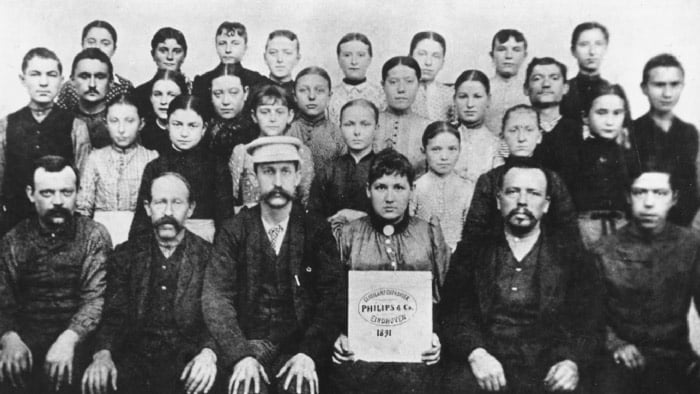Philips, a renowned global brand, has been a trailblazer in multiple industries for over a century. From its humble beginnings in Eindhoven, Netherlands, the company has expanded into various sectors, including consumer electronics, healthcare technology, and sustainability. In this review, we will delve into the company's fascinating history, its pivotal moments of growth, and its ongoing commitment to innovation and social responsibility. Uncover the advanced capabilities of the Philips 5500 LatteGo review
Humble Beginnings: The Birth of Philips
Founded in 1891 by Gerard Philips and his father Frederik in Eindhoven, Netherlands, Philips started as a small manufacturer of carbon-filament lamps. Despite facing significant financial challenges and intense competition, Philips managed to thrive due to its unwavering dedication to quality and continuous improvement. From its modest beginnings, the company gradually evolved into a global powerhouse that would revolutionize various industries. Get a closer look at the features of the Philips 5400 LatteGo review
The Road to Growth: Philips’ Early Success
By the early 20th century, Philips had grown to become one of Europe’s leading manufacturers of light bulbs. This rapid expansion was driven by mass production and an unwavering focus on innovation. A pivotal turning point for the company came in 1914 when it established its Research Laboratory, or NatLab. NatLab would become the birthplace of numerous groundbreaking technologies that paved the way for Philips’ success in subsequent decades. Compare these two machines side by side in the Philips LatteGo 5400 vs 4300 review
Pioneering the Radio Industry
As the world entered the 1920s and 1930s, radio emerged as a powerful communication tool. Recognizing the potential of this new medium, Philips began manufacturing radios that quickly became popular for their affordability and high quality. By 1932, just five years after starting radio production, Philips had sold over a million radios, solidifying its position as a leader in consumer electronics. Discover the differences among these models in the Philips 3200 vs 4300 vs 5400 review
Resilience During World War II
The outbreak of World War II presented severe challenges for Philips, as its facilities were damaged and operations disrupted. However, the company demonstrated remarkable resilience. Key personnel were relocated to safer areas, and research continued despite the difficult circumstances. During the war, Philips made significant contributions to radar technology, showcasing its ability to adapt and innovate even in the face of adversity. Learn how these two models compare in the Philips 3200 vs 4300 review
Post-War Expansion and the Cassette Revolution
In the post-war years, Philips experienced a period of rapid growth and innovation. One of its most transformative inventions was the compact audio cassette, introduced in 1963. This invention revolutionized the way people listened to music by providing an affordable and portable medium for recording and playback. The cassette tape dominated the market for decades and played a significant role in shaping consumer behavior. See what sets these models apart in the Philips 3200 vs 5400 review

The Compact Disc Era: A Partnership with Sony
The late 1970s saw Philips collaborate with Sony to create the compact disc (CD), a digital audio format that quickly replaced the cassette tape as the industry standard for music playback. The CD became an instant global phenomenon, cementing Philips' reputation as a pioneer in the music industry and marking a significant step forward in the evolution of digital technology. Get a detailed review of the Philips LatteGo 5400 review
Expanding into Consumer Electronics and Television
As the 20th century progressed, Philips diversified its portfolio and became a leader in the consumer electronics industry. The company played a crucial role in developing the VHS tape format and the DVD, which changed the way people watched movies at home. In the 1990s, Philips introduced the Ambilight TV, an innovative product that enhanced the viewing experience by projecting ambient light around the screen, setting the company apart as an industry leader in home entertainment technology. Discover the compact and efficient design of the Philips 3200 LatteGo review
Shifting Focus to Healthcare Technology
By the 1980s, Philips began shifting its focus to the healthcare sector, recognizing the growing demand for medical innovations. The company expanded into medical imaging, patient monitoring, and health informatics, positioning itself as a leader in healthcare technology. Strategic acquisitions and a strong focus on research and development allowed Philips to build a comprehensive portfolio aimed at improving patient care and advancing medical research. Dive into the advanced features of the Philips 4300 LatteGo review
The Transition to Health Tech: A New Chapter
In recent years, Philips has made a major transition, focusing its efforts on health technology and lighting solutions. In 2016, the company spun off its lighting division into a separate entity called Signify, allowing Philips to concentrate fully on innovations in health technology. Today, the company is at the forefront of connected care, digital health solutions, and advanced medical devices, all aimed at improving patient outcomes and healthcare delivery worldwide.
Commitment to Sustainability and Social Impact
Throughout its history, Philips has been committed to sustainability and social responsibility. The company has set ambitious goals, including achieving carbon-neutral operations and embracing circular economy principles. Its sustainability initiatives are closely linked to its health technology mission, with a focus on creating products that positively impact both society and the environment.
Embracing the Future with Digital Health and AI
In line with the growing trend of digital transformation in healthcare, Philips has integrated artificial intelligence (AI) and data analytics into its healthcare solutions. These technologies help improve efficiency, enhance patient care, and provide personalized health solutions. Through AI-driven diagnostics, connected care, and advanced medical devices, Philips is shaping the future of healthcare, ensuring that technology plays a central role in improving patient well-being.
Philips' Legacy: A Story of Innovation, Resilience, and Impact
Philips' journey from a small light bulb manufacturer in Eindhoven to a global leader in health technology is a testament to the company's resilience, innovation, and adaptability. Over the years, Philips has continuously pushed the boundaries of technology, creating products and solutions that have had a lasting impact on multiple industries.
As the company continues to evolve and innovate, its legacy serves as a powerful reminder that perseverance, creativity, and a commitment to improving lives can lead to lasting success. With a strong focus on advancing healthcare technology and sustainability, Philips is poised to continue making a positive impact on the world for years to come.

Product Review Conclusion: Philips – A Legacy of Innovation and Excellence
Philips' remarkable journey from its humble beginnings to becoming a global leader in health technology showcases the company's ability to adapt and innovate over time. Whether in consumer electronics, healthcare, or sustainability, Philips has consistently pushed the envelope, delivering groundbreaking solutions that have shaped the industries it operates in.
Today, Philips stands as a beacon of innovation, with a strong commitment to improving lives through advanced healthcare technologies and sustainable practices. As the company continues to develop cutting-edge solutions, it remains a powerful force driving positive change across the globe.
